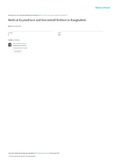Medical expenditure and household welfare in Bangladesh
Date
2016-10Publisher
BRAC Institute of Governance and Development (BIGD)Metadata
Show full item recordAbstract
The reliance on heavy out-of-pocket (OOP) expenditure for medical care leads to households getting trapped into a vicious cycle of poverty. In Bangladesh, private health care expenditure accounts for almost 64% of total health expenditure being financed from out-of-pocket (OOP). These escalating medical costs cause financial hardship for a majority of households and may even lead to a welfare loss. Using household-level data from Household Income and Expenditure Survey-2010 and applying a log-linear regression estimation procedure, the study estimates the catastrophic impact of health expenditure on household welfare. Welfare loss is associated with a reduction of ‘food expenditure’ and ‘non-food expenditure’. The study finds that compared to households with no healthcare expenditure, households with non-catastrophic healthcare expenditure reduced food expenditure by 3.1% and households with catastrophic healthcare expenditure reduced food expenditure by 15.2%. Compared to households financing healthcare from internal sources, households with external financing reduced food and non-food expenditures by 5.57% and 1% respectively and households that finance healthcare from both internal and external sources reduced food and non-expenditures by 11.4% and 16% respectively. Our findings indicate that a catastrophic health event diverts household income to health care by a large amount (28.1%) which causes significant reduction in non-food expenditure. eventually causing a substantial loss in household welfare. Catastrophic health events did not reduce food consumption significantly but it has a significant impact on non-food expenditure. Non-hospital medical expenses such as the cost of medicine was the primary cause of facing catastrophic health event.

